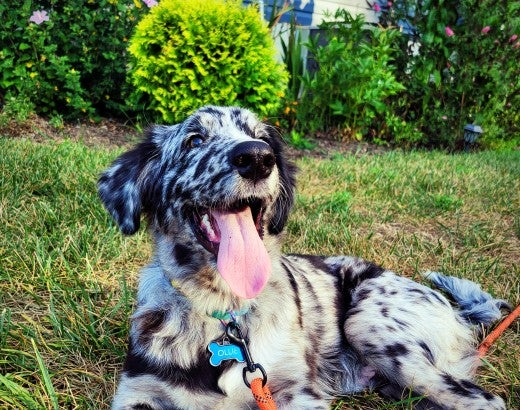Twenty years ago, in the days after September 11, 2001, heroic first responders did the unthinkable task of going into the wreckage to search for signs of life. By their sides were the search and rescue dogs who, over the last two decades, have garnered so much love and admiration for their role in seeking survivors.
One story I’ve read that stays with me is about something that happened during these searches between the first responders and these dogs. When the dogs went hours and hours, and then days, without finding any signs of life, their energetic spirit began to leave them. They seemed defeated and devoid of hope. To help keep them going, their human partners staged the discovery of a living person, acting out what we all hoped would happen at that site. After this playacting, the dogs showed signs of renewed energy and purpose—I imagine their limp tails beginning to wag again.
Even though the search and rescue dogs who moved through the rubble in the days after the attacks found few signs of life, they clearly played an outsized role in the lives of the first responders who faced that unthinkable experience, walking alongside them across a landscape of dust, debris and destruction all around. Together, these human-canine partners did one of the hardest jobs of all.
I think I return to this story because it shows something about how the relationships between humans and animals are endlessly multifaceted, fascinatingly complex and—perhaps most important to remember—deeply intertwined. This fact shapes so much of my thinking and our work here at the Humane Society family of organizations: Animals do not occupy a separate realm of their own but are inextricably intertwined with our own lives in the world we share.
I believe that every animal has a story, and so many of these stories demonstrate our special interdependence with them. Just recently, I read about a dog in South Korea saving his 90-year-old companion’s life. I also read about a New York City firehouse adopting a pig to raise the spirits of the firefighters. Narratives like these surface every day, showing how animals are our fellow creatures, highly deserving of all the protection, recognition and respect we can build within the larger society and all of its institutions.
Recognizing our relationships with animals is also essential as we look toward the future and continue to raise awareness for animals and their conditions. The pandemic is a painful wakeup call: We can’t continue to keep animals confined in horrific and debilitating conditions on fur farms, wildlife markets and factory farms and think this doesn’t directly impact human health. Climate change and related problems like disasters never before faced by human beings in history, such as environmental destruction and an unprecedented number of animal species facing extinction, can only be met with strength and perseverance if our society fully recognizes the deep importance of animals and the natural world, as well as our interdependence. This is increasingly what I understand as—and strive for in—a “humane society.”
Follow Kitty Block on Twitter @HSUSKittyBlock.



